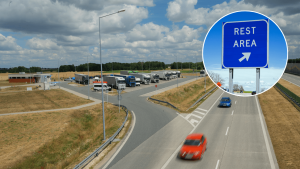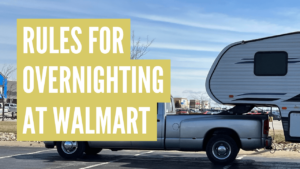RVers often mention Sam’s Club when talking about free overnight parking. Some stores allow it, others don’t, and the uncertainty has turned a simple parking question into a debated topic among travelers.
So what does Sam’s Club actually say about it?
Sam’s Club’s Official Overnight Parking Policy
Sam’s Club does not have a company-wide policy that permits or forbids overnight parking. Instead, each store manager decides based on local zoning laws, safety regulations, and property ownership agreements.
Here’s exactly what their Help Center page on the topic has to say:

As you can see, it states:
“Parking policies may vary from club to club due to local zoning restrictions. You should verify with the Club Manager if it is permissible to use the parking lot for any overnight vehicle stays.”
In some areas, local ordinances prohibit any overnight stays in commercial lots. In others, managers have the flexibility to allow it when space and security permit.
Furthermore, that statement puts the responsibility on travelers to ask before settling in. Even if a location has allowed overnight parking in the past, rules can change without notice, especially when local authorities update zoning codes or property management policies.
In short, Sam’s Club leaves the decision at the store level. RVers who plan to stay overnight should always check in person, ask respectfully, and follow whatever direction the manager gives.
Why Policies Differ by Location
The biggest reason Sam’s Club policies vary is local regulation. Many cities and counties have ordinances that restrict or ban overnight parking in retail or commercial lots. These rules are often tied to zoning codes, safety requirements, or concerns about liability and security. Even if a store manager wants to allow RVs to stay, local law may not permit it.
Property ownership also plays a role. Some Sam’s Club locations share parking lots with nearby stores or are part of a larger shopping complex. When the lot is managed by a third party or covered by a shared-use agreement, the store may have little control over how it’s used after hours.
Insurance policies can further complicate the issue. Allowing overnight guests can expose a store to potential liability if an accident or incident occurs on the property. For that reason, some managers take a cautious approach and prohibit overnight parking altogether.
The bottom line is that there is no single nationwide rule. Each store must balance company guidelines, local ordinances, and property agreements before deciding if an RV can stay overnight.
How to Ask for Permission the Right Way
If you plan to stay overnight at a Sam’s Club, the first step is always to ask. Do not assume it’s allowed just because you’ve seen other RVs parked there. A short, polite conversation with the store manager can save you from a ticket or a knock on your camper door.
Either call ahead or walk inside during business hours and ask to speak with a manager. Be clear about your intentions. A simple approach works best: mention that you are passing through, you’re fully self-contained, and planning to leave early. Most managers appreciate the courtesy.
If the manager declines, thank them and move on (I cover a few alternative spots below). Some stores are bound by city rules or property management restrictions that can’t be changed. Handling it respectfully helps keep the door open for future travelers.
Overnight Parking Etiquette
Even with permission, how you conduct yourself while parked at Sam’s Club can determine whether other RVers are welcome in the future. Follow these simple guidelines to keep the experience positive for everyone:
- Stay one night only. These lots are intended for short stops, not multi-day stays.
- Park along the outer edges of the lot. Leave customer spaces near entrances open.
- Skip the campsite setup. No extended awnings, grills, chairs, tables, or generators.
- Stay quiet and discreet. Limit noise and bright lights at night.
- Clean up completely before leaving. Do not leave any trash or debris behind.
- Make a purchase inside the store. While not required, even a small purchase shows appreciation for the courtesy.
- Leave early the next morning. Departing before the store gets busy is respectful and expected.
A polite, low-profile stay helps maintain a good relationship between RVers and the stores that still allow overnight parking.
Safety and Common Sense Tips
Overnighting in a parking lot is different from staying at a campground, for obvious reasons. You may be surrounded by late-night shoppers, delivery trucks, and so on. A few precautions can make your stay safer and more comfortable.
- Choose a well-lit area. Light discourages unwanted attention and improves visibility at night.
- Avoid delivery zones. Stay clear of loading docks, trailers, and areas marked for trucks.
- Lock all doors and compartments. Keep valuables out of sight.
- Stay aware of your surroundings. If something feels off, trust your instincts and move on.
- Keep windows and shades closed at night. It helps maintain privacy and a lower profile.
- Use travel apps to check recent reviews. Apps like Allstays, RV Parky, and Campendium often have current reports from other RVers about which Sam’s Club locations still allow overnight stays and how the stay went.
Alternatives if Sam’s Club Isn’t an Option
Even when a Sam’s Club location doesn’t allow overnight RV parking, plenty of other businesses and facilities still welcome RV travelers. Checking a few options before you arrive can save time and frustration if you’re turned away.
- Walmart. Still one of the most common overnight stops, though, like Sam’s Club, permission varies by store. Always ask first.
- Cracker Barrel. Many locations allow one-night RV parking and often provide designated spaces for larger vehicles.
- Cabela’s and Bass Pro Shops. These stores frequently welcome RVs, and some even offer dump stations or freshwater fills.
- Camping World. A few branches allow overnight stays for customers, especially near highway corridors.
- Rest areas and truck stops. These are good fallback options if retail lots prohibit parking, but always confirm posted rules.
- City or county campgrounds. Small municipal parks often have affordable sites for quick overnight stays with basic hookups.
Having a short list of alternatives keeps your travel flexible and avoids the stress of being turned away late at night.







Write a comment